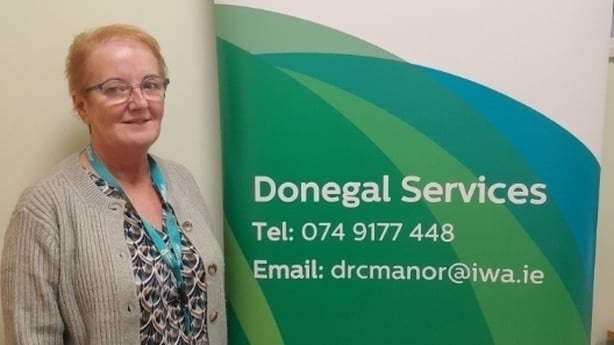A strike by health and social care workers in the community and voluntary sector, which was due to begin today, has been called off.
Talks between unions and Government representatives at the Workplace Relations Commission (WRC) ended shortly after 3am with an agreement on pay.
Proposals include an offer from the Government of an 8% increase in funding for pay. A 5% offer was previously rejected by unions.
The increase will come in three phases backdated to April of this year and will run until March of next year.
There will be reengagement between the parties in December.
As part of the agreement, there will also be a method established to deal with the question of restoring the link between workers in the community and voluntary sector with equivalent pay grades in the Health Service Executive.
Today's strike action would have involved 5,000 workers across 17 charities and organisations including the Irish Wheelchair Association and Enable Ireland.
The action has now been suspended pending the outcome of consultations and ballots of union members.
Leaving the talks at the WRC this morning, Liam Berney, Industrial Officer with the Irish Congress of Trade Unions, said they would be recommending acceptance of the proposals.
"After a long number of hours and intensive negotiations we have a set of proposals from the WRC that we will now be consulting members on over the next couple of weeks," Mr Berney said.
"There is an offer on pay and there is a method for dealing with the question of restoring people's pay to the point it should be at, equivalent to the pay scales for equivalent grades in the HSE."
"We are happy that the proposals that have emerged here will allow us to re-establish that link and put members back on the points of the pay scale that they should have been on for the last few years," he added.
The unions involved in the dispute are Fórsa, SIPTU and the INMO.
In a memo to members this morning, Fórsa said the planned strike action would not be going ahead.
"It has been agreed to suspend the proposed industrial action to allow members the opportunity to consider the proposals," the memo stated.
The union said details of briefing sessions and ballot arrangements are to follow.
The Minister for Health has welcomed the decision to call off the strike.
Stephen Donnelly said he wants "to thank all of those involved, both the union representatives and those on behalf of Government."
Speaking as he arrived for a Cabinet meeting at Dublin Castle, the minister said "it's very welcome to see", adding, "We never wanted to see those services close. They are essential and it's great to see."
Mary McGrenra is Service Coordinator for the Irish Wheelchair Association in Donegal.
She says workers are happy that strike action was suspended but added that it should never have got to this point.

"This is an interim arrangement and workers have still to be balloted. We're a long way off resolution and we haven't had pay parity since 2013.
"Looking ahead we want commitment from the Government on the realignment of grades and proper funding put in place."
She also took issue with Minister Donnelly's comments welcoming the calling off of the strike.
"He said it was great to see because we were essential workers. If we were really that essential to the Government they would never have allowed us to reach this point"
In a statement the Irish Wheelchair Association heavily criticised the Government for causing widespread "disruption, fear, and angst".
CEO, Chris Hoey said it was heartbreaking to witness the unnecessary challenges faced by their service users and employees as a result of this ordeal.
"It is crucial that the re-linking of pay salaries is established to ensure security in the sector and prevent workers from seeking higher pay rates elsewhere.
"It is truly regrettable that our people, including service users and employees, were pushed to the brink before these talks even began.
"The stress imposed on families across the country cannot be reversed.
"This treatment by the Government continues to demonstrate the undervaluation of people with disabilities.
"We will tirelessly work to reverse the impact of the proposed strike action, although some effects cannot be instantaneously reversed.
"This is not good enough.
"We would like to express sincere thanks to our employees and service users for their unwavering support and to those who bravely shared their stories with the public."
Earlier, Disability Federation of Ireland said there was a "feeling of absolute relief" that the strike action had been suspended.
John Dolan, CEO said that there was a particular cruelty in letting disabled people and their families endure the dread of strike action.
"It should not have come to this. But, right now, we all have work to do to ensure that what finally emerges is both fair and sustainable"
He said there were implications for the collective efforts of Unions involved to implement the United Nations Convention on the Rights of Persons with Disabilities (UN CRPD).
"A culture has been embedded which saw it as acceptable to have some elements of essential health and social care services resourced on terms that were substantially less than what was the agreed rate by Government with others delivering the same or similar services.
"The fact that the HSE was setting the funding levels for the Section 39 organisations while having a higher rate for other organisations and itself, is significant"
John Dolan said that a resolution of the issue required funding, a "serious" change in culture and a change in how decisions are made and implemented. "Government cannot simply leave it to the departments of Health, Public Expenditure, Department of Children, Equality, Disability, Integration and Youth along with the HSE to fully resolve this issue"
He said that once the strike action is resolved, there was a long way to go and that all parties needed to work effectively together.
Additional reporting: Teresa Mannion






